

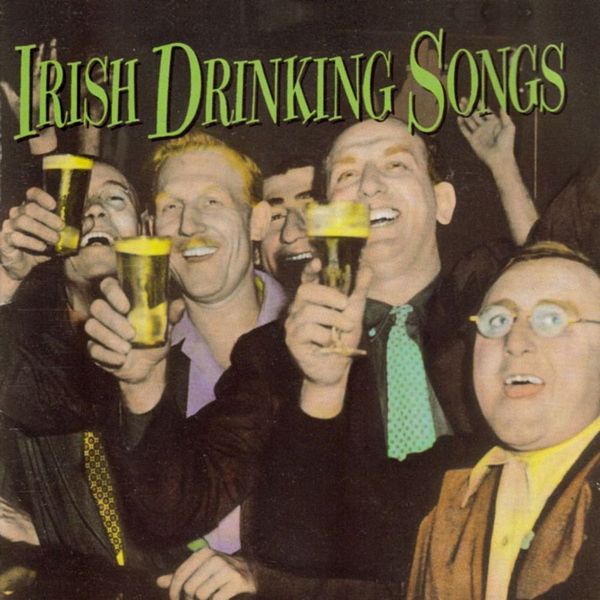 |
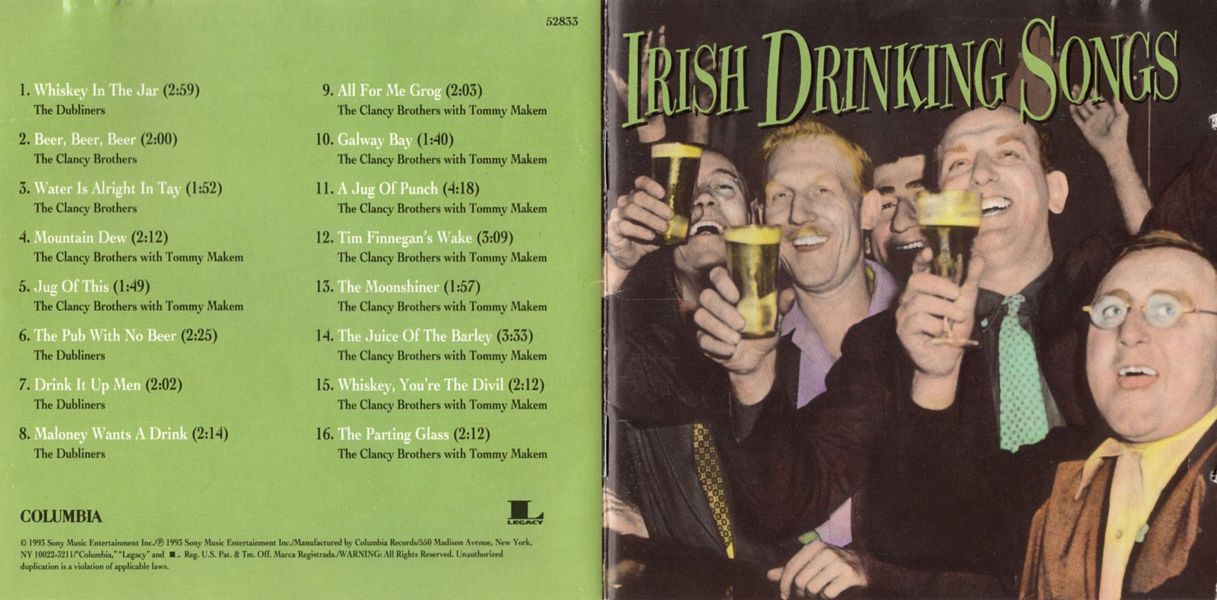
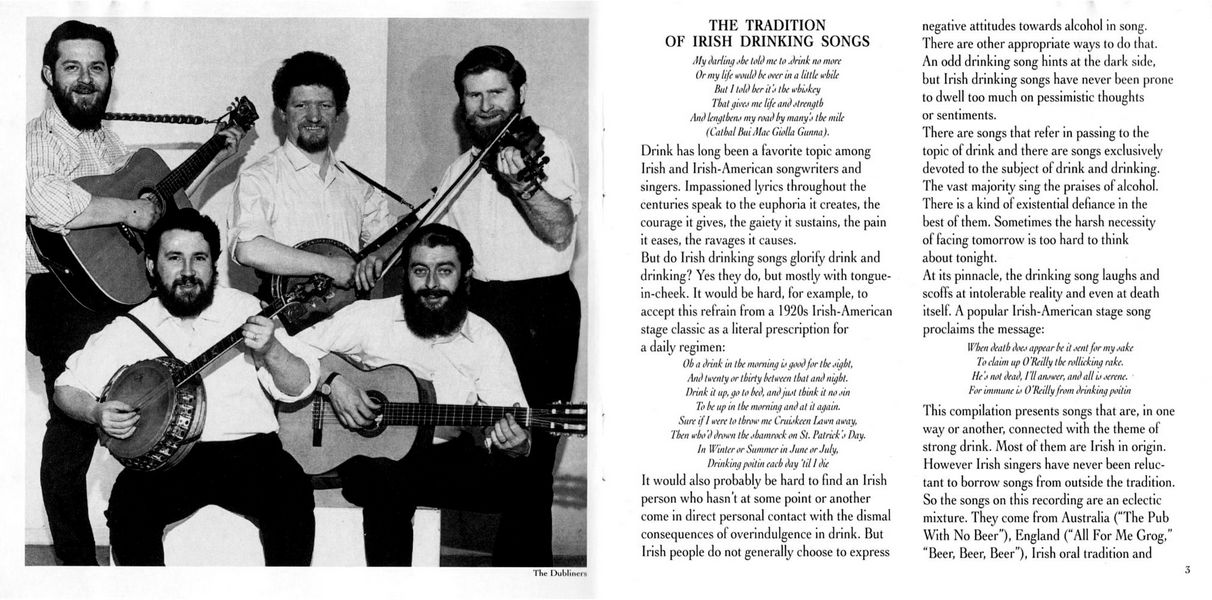 |
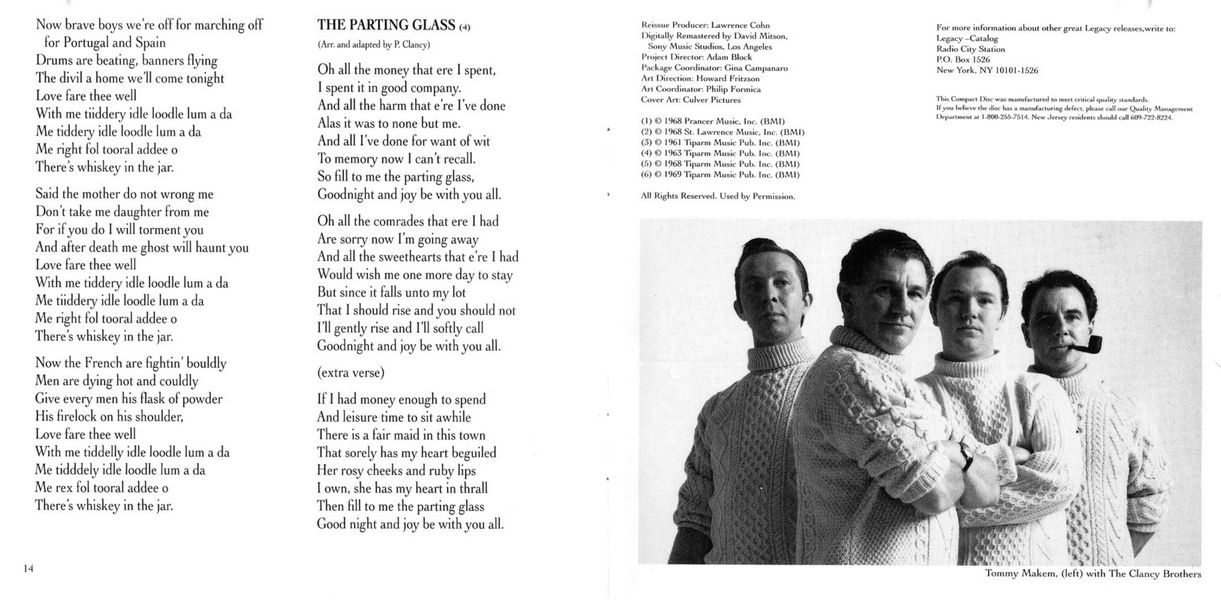
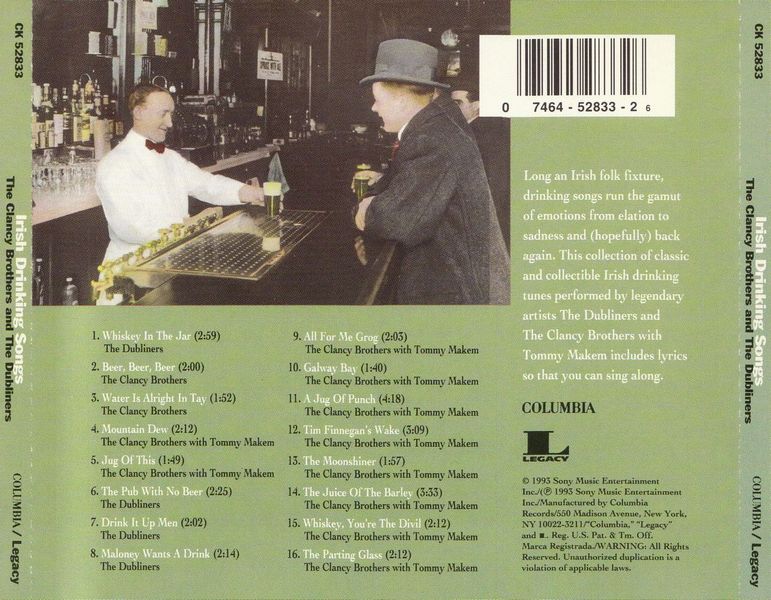
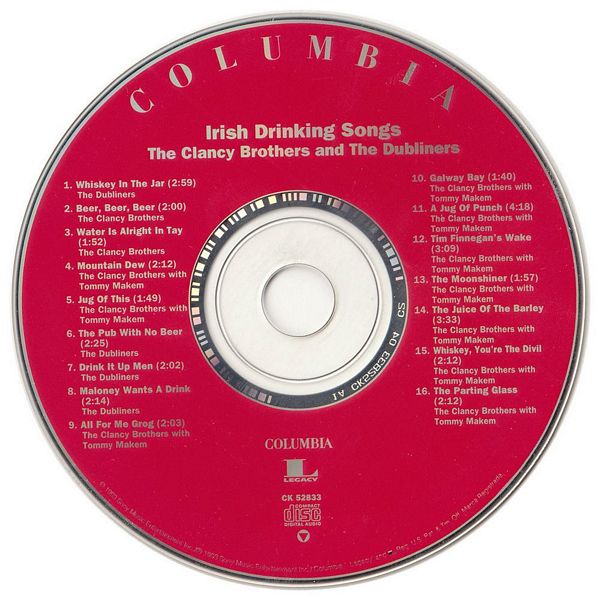 |
| more images |
Sleeve Notes
THE TRADITION OF IRISH DRINKING SONGS
My darling she told me to drink no more
Or my life would be over in a little while
But I told her it's the whiskey
Thai gives me life and strength
And lengths my road by many's the mile
(Cathal Bui Mac Giolla Gunna).
Drink has long been a favorite topic among Irish and Irish-American songwriters and singers. Impassioned lyrics throughout the centuries speak to the euphoria it creates, the courage it gives, the gaiety it sustains, the pain it eases, the ravages it causes.
But do Irish drinking songs glorify drink and drinking? Yes they do, but mostly with tongue-in-cheek. It would be hard, for example, to accept this refrain from a 1920s Irish-American stage classic as a literal prescription for a daily regimen:
Oh a drink in the morning is good for the sight,
And twenty or thirty between that and night.
Drink it up, go to bed, and just think it no sin
To be up in the morning and at it again.
Sure if I were to throw me Cruiskeen Lawn away,
Then who'd drown the shamrock on St. Patrick 's Day.
In Winter or Summer in June or July,
Drinking poitin each day 'till I die
It would also probably be hard to find an Irish person who hasn't at some point or another come in direct personal contact with the dismal consequences of overindulgence in drink. But Irish people do not generally choose to express negative attitudes towards alcohol in song. There are other appropriate ways to do that. An odd drinking song hints at the dark side, but Irish drinking songs have never been prone to dwell too much on pessimistic thoughts or sentiments.
There are songs that refer in passing to the topic of drink and there are songs exclusively devoted to the subject of drink and drinking. The vast majority sing the praises of alcohol. There is a kind of existential defiance in the best of them. Sometimes the harsh necessity of facing tomorrow is too hard to think about tonight.
At its pinnacle, the drinking song laughs and scoffs at intolerable reality and even at death itself. A popular Irish-American stage song proclaims the message:
When death does appear he it sent for my sake
To claim up O'Reilly the rollicking rake.
He's not dead, I'll answer, and all is serene.
For immune is O'Reilly from drinking poitin
This compilation presents songs that are, in one way or another, connected with the theme of strong drink. Most of them are Irish in origin. However Irish singers have never been reluctant to borrow songs from outside the tradition. So the songs on this recording are an eclectic mixture. They come from Australia ("The Pub With No Beer"), England ("All For Me Grog," "Beer, Beer, Beer"), Irish oral tradition and the Irish stage and music hall, ("Drink It Up Men," "Kilgarry Mountain," ["Whiskey In The Jar"], "The Juice Of The Barley," "Maloney Wants A Drink," "Jug Of This," "Whiskey, You're The Divil," "A Jug Of Punch," "The Moonshiner," "Water Is Alright In Tay"), and some are drawn from the Irish-American stage tradition.
Irish drinking songs were hugely popular in American vaudeville and variety theater. Irish drunken brawls were He rigueur on the 19th century American stage where ethnic stereotypes abounded. The Irish party song was a staple genre. The scenario was always the same. A party was given, guests were invited, drink was consumed in large quantities, insults flew, fighting erupted and the parry broke up in mayhem.
"Finnegan's Wake" is a good example of the genre. It became popular in Irish-American variety theater in the 1860s and was immortalized when James Joyce used the title to name his most famous work. New York impresario, playwright and actor, Ed Harrigan, wrote the words of "Mountain Dew" in the early 1870s. His collaborator, David Braham composed the music, and the song became one of his biggest hits and was reprinted in the scores of songsters. The song was given a new lease on life in the 1960s when it was recorded and popularized by The Clancy Brothers with Tommy Makem. Parodies of well known songs have always been a feature of comic stage songs. Tommy Makem and The Clancy Brothers' spoof of "Galway Bay" is in this tradition.
The natural milieu of the drinking song is where alcohol is consumed. In Irish life, this most commonly the local pub. In America, it's the Irish bar, particularly on St. Patrick's Day when green beer ranks up there with shamrocks, shillelaghs and leprechauns among the most common conventional images of Irish-American popular culture. Irish bars are part of the fabric of Irish-American social life. Entertainers who perform in these bars will tell you that they are always expected to throw in a couple of drinking songs in the course of an evening. The customers and the management like it when they do. It's part of the "scene."
THE ARTISTS
The singers of the drinking songs on this recording are The Dubliners and
The Clancy Brothers with Tommy Makem; the two most popular Irish folk singing groups since the 1960s. Both groups are known for their performances of drinking songs.
The Clancy Brothers with Tommy Makem were four young Irish actors who decided to switch careers and become professional Irish folk entertainers in the late 1950s when they were living in New York City at the time of the American Folk Revival. They came up with an exciting new way of performing the old Irish traditional songs and ballads they had heard in their youth. This made them instantly appealing to general audiences in America. They incorporated guitar and five-string banjo and lusty harmony singing in their arrangements of the songs and achieved enormous commercial success on both sides of the Atlantic, while starting a whole revival of interest in Irish folk song back in Ireland in the process.
The colorful The Dubliners, the bearded Bohemians of the Irish folk scene, were an instant sensation when they first started performing as a group in Dublin in the early 1960s. The Dubliners were the perfect pub group, with a hard-living, hard-drinking image. Working class, middle class, and college audiences alike adored them and roared choruses of songs enthusiastically along with them on Saturday nights, with foaming, table-tapping, glasses clinking a boozy accompaniment. Their music was rambunctiously compelling. Nobody had ever heard anything quite like it before. They introduced Irish audiences to a whole new repertoire of traditional and contemporary folk songs from Britain and Ireland.
The final drink of a convivial evening is often a highly emotionally charged event among the Irish. The communal drink salutes the ties of friendship and companionship and helps ease the pain of parting. There is no more eloquent and poignant song on this topic than "The Parting Glass." The Clancy Brothers traditionally close their concerts with this song, and it also fittingly closes this recording.
Oh all the money that ere I spent,
I spent it in good company.
And all the harm that ere I've done
Alas it was to none but me.
And all I've done for want of wit
To memory now I can't recall.
So fill to me the parting glass,
Goodnight and joy be with you all,
Mick Moloney
Philadelphia, September 1992
Review of by Seán McGuinness
This CD features previously unreleased versions of "Tim Finnegans Wake" and "The Moonshiner" from the In Person at Carnegie Hall concert (both are good strong versions), as well as the previously unreleased introductions to "The Juice of the Barley" and "Jug of Punch" from the same concert. It's nice to have these. The rest of the CD contains previously released Clancy songs, as well as previously released songs by the Dubliners. The theme of the CD is a bit overwhelming and the release suffers from a lack of other kinds of material (love songs, ballads, rebel songs, etc), which offer a balance. Other than this, the CD only includes three Clancy songs not otherwise released on CD.
I rate this CD a C+.
Reviews Copyright © Seán McGuinness, 2001-2015